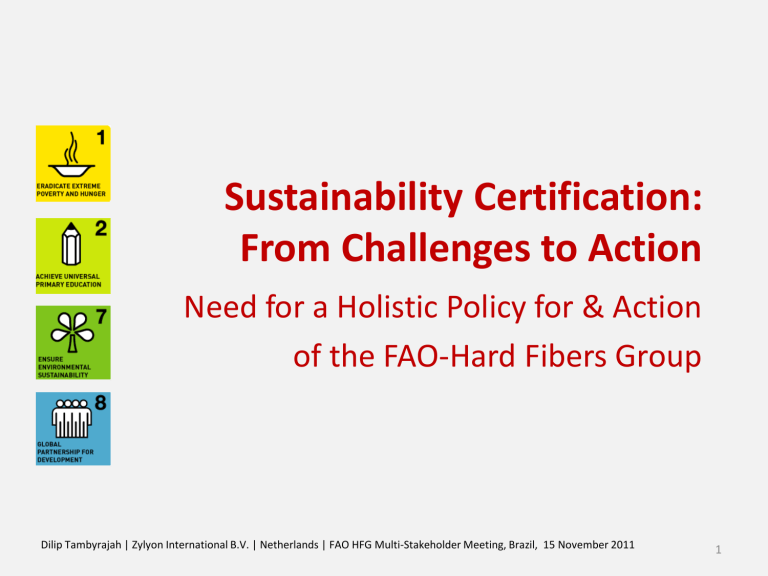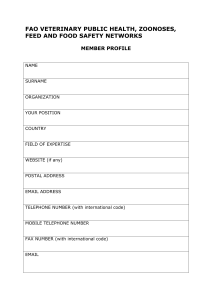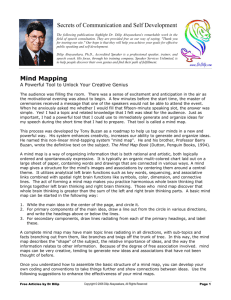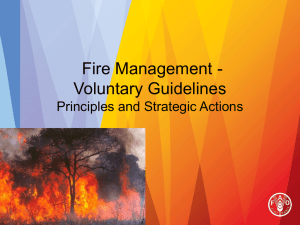Sustainability Certification: From Challenges to Action of the FAO-Hard Fibers Group

Sustainability Certification:
From Challenges to Action
Need for a Holistic Policy for & Action of the FAO-Hard Fibers Group
Dilip Tambyrajah | Zylyon International B.V. | Netherlands | FAO HFG Multi-Stakeholder Meeting, Brazil, 15 November 2011
1
What is the Problem?
Number of Human Beings (Now + Future) X Behaviour > Capacity of Earth
Metaphorically:
Some (Developed) Countries are Gang Banging Mother Earth!!
For the technically oriented:
Impact = Population x Affluence x Technology (I=PxAxT)
Impact : Anthropogenic Impact
Population : Absolute Number of People
Affluence : Per Capita Consumption
Technology: Use of Resources and Environmental impact per unit consumption
Source : Development by Ehrlich, Holdren and Commoner in the early 1970s ; Meadows et.at. 2004.
Dealing with this problem is about Sustainability
No definitions of Sustainability provided because there are many equally valid ones.
Dilip Tambyrajah | Zylyon International B.V. | Netherlands | FAO HFG Multi-Stakeholder Meeting, Brazil, 15 November 2011
2
Over consumption – Effect on CO2 Emission
One of the causes for failure
Copenhagen?
Dilip Tambyrajah | Zylyon International B.V. | Netherlands | FAO HFG Multi-Stakeholder Meeting, Brazil, 15 November 2011
3
IPAT & Options
Impact = Population x Affluence x Technology
What to do?
Political issue?
Lifestyles:
What and
How much to consume
Examples :
ECO-Efficiency
ECO-3Effectivity
Policy Area that can be dealt with at industry level (Hard Fibers)
Eco Efficiency : Factor 4/10; Material
Input per unit service (MIPS).
ECODesign, LCA etc.
Eco Effectiveness : Cradle-to-Cradle
(e.g. closed loop systems / ReDesign-
Rethink)
Dilip Tambyrajah | Zylyon International B.V. | Netherlands | FAO HFG Multi-Stakeholder Meeting, Brazil, 15 November 2011
4
The Macro Setting : Governments, (Multi National)
Corporations and NGO’s / Civil Society Organizations
Failure of “Market Driven” approaches (partly due to lack of
Governance structures including Reporting).
Increasing Power of limited number of Multi-National Corporations and tying up of Value Chains (e.g. 2 companies have 50% BioTech patents;
3 companies control at least 80% of the global tea value chain).
(Source World Bank WDR2008).
Failure of NGOs /CSO : Too much “hobbyism” from donor countries.
Gladly misused by receiving countries.
Mis-use of funds on both sides.
NGOs /CSO pushing their own agendas at the cost of developing countries. Some powerful NGOs also operating in the “Certification domain” (e.g. Fair Trade, Sustainability etc.). Now colluding with MNCs .
Dilip Tambyrajah | Zylyon International B.V. | Netherlands | FAO HFG Multi-Stakeholder Meeting, Brazil, 15 November 2011
5
The key focus for the Hard Fibers Group:
Certification Schemes are too important for the Hard Fiber Producers to ignore. It will be required if developing countries like it or not.
Hard Fibers group must be in the drivers seat to minimize excessive demands and to be Cost effective.
This is a complex and technically broad area so will only deal with some relevant on going aspects in this presentation!!
Dilip Tambyrajah | Zylyon International B.V. | Netherlands | FAO HFG Multi-Stakeholder Meeting, Brazil, 15 November 2011
6
Sustainability to Corporate Social Responsibility (CSR)?
People Planet
Profit
Profit
Low on People
Low on Planet
Triple P
Dilip Tambyrajah | Zylyon International B.V. | Netherlands | FAO HFG Multi-Stakeholder Meeting, Brazil, 15 November 2011
7
Explosion of Sustainability /ECO Certification Schemes!!
Dilip Tambyrajah | Zylyon International B.V. | Netherlands | FAO HFG Multi-Stakeholder Meeting, Brazil, 15 November 2011
8
Some themes that are being looked at from CSR perspective
Examples of aspects :
Social aspects:
Child Labour
Forced Labour
Safe work conditions
Working time
Salary
Ethical aspects:
Bribery / Corruption
Animal welfare
Safe products?
Fair Price to producers
Salary at all levels
Environmental aspects:
Energy use
Resources use
Safety
?
The items per aspect are indicative only and not limitative.
Discussions on-going about:
Sustainability : Life Cycle Assessment
Dilip Tambyrajah | Zylyon International B.V. | Netherlands | FAO HFG Multi-Stakeholder Meeting, Brazil, 15 November 2011
9
Challenges to be faced by the Hard Fibers, Jute and
Kenaf Group
Some issues to be dealt with by Emerging & Developing countries:
Setting systems boundaries
Availability of reliable data
Too complicated/academic?
Could be costly for developing countries?
Knowing exactly what Life Cycle Analysis should be for?
Stakeholder management?
Industry based Standardization?
Dilip Tambyrajah | Zylyon International B.V. | Netherlands | FAO HFG Multi-Stakeholder Meeting, Brazil, 15 November 2011
10
What could all this mean?
For the Hard Fibers Group – Certification Schemes
There will be increasing pressures from different stakeholders to implement certification schemes. Particularly Govts, NGOs & MNCs.
Hard Fibers Group should keep control of the process to be cost effective.
This means the Hard Fibers must work as a group towards common goals in this area.
Not under estimate the complexity of the subject and the costs involved.
Take a holistic & workable framework that is in line with the sectors needs.
Dilip Tambyrajah | Zylyon International B.V. | Netherlands | FAO HFG Multi-Stakeholder Meeting, Brazil, 15 November 2011
11
What we are doing as the Hard Fibers Group :
INFO – Sustainability Certification Scheme (1 of 3)
With the support of the Common Fund For Commodities, Amsterdam,
The Netherlands a (Fast Track) project recently started to develop a Blue
Print for Sustainability Certification for Hard Fibers.
The project is endorsed by the FAO Inter-Governmental Group on Hard
Fibers.
Implementation by International Natural Fiber Organization (INFO)
Expert guidance and assistance by Prof Andre Faaij & Dr Martin Patel of The
Corpenicus Institute, University of Utrecht, The Netherland. Expertize on biomass certification and Life Cycle Analysis.
Kick-off session in Salvador, Brazil on 14 November 2011.
Project results expected in 3rd quarter 2012
Dilip Tambyrajah | Zylyon International B.V. | Netherlands | FAO HFG Multi-Stakeholder Meeting, Brazil, 15 November 2011
12
What we are doing as the Hard Fibers Group :
INFO – Sustainability Certification Scheme (2 of 3)
People
INFO:
Sustainability
Certification
Scheme
Factors of Production:
Land
Labour (& Management)
Production unit Size
Energy
Water, Air, Agro inputs
Technology, Transport, Finance etc.
Planet
INFO
SCS
Profits
Cultivation &
Harvesting
Abaca
– Pseudo Stem
Coir
– Coconut husk
Sisal
– Leaf
Unutilized parts
Waste
Note: Coconut husk is a waste product of coconut plantations
Fiber Extraction Processing:
Semi Finished
& Finished
Fiber
By-Products
Waste
Semi-finished &
Finished products for Business and
Consumer demand
Waste
Source: Dilip Tambyrajah
– INFO – 30/03/2011
Dilip Tambyrajah | Zylyon International B.V. | Netherlands | FAO HFG Multi-Stakeholder Meeting, Brazil, 15 November 2011
13
What we are doing as the Hard Fibers Group :
INFO – Sustainability Certification Scheme (3 of 3)
MANAGEMENT AND OPERATIONAL STRUCTURE
SUSTAINABILITY SCHEME
Scope & Objectives
Concerns & Criteria
Indicators & Verifiers
Reviews, Analysis
& Recommendations of Fast Track project.
Maximum 9 months
Development and implementation after
Fast Track Project.
Period required
2 to 3 Years
Dilip Tambyrajah | Zylyon International B.V. | Netherlands | FAO HFG Multi-Stakeholder Meeting, Brazil, 15 November 2011
14
Thank you !
Dilip Tambyrajah
Managing Director -Zylyon International B.V.
Secretary – International Natural Fiber Organization
(INFO)
Alexanderstraat 6, 2713 AT Zoetermeer, The
Netherlands
Tel: +31 79 316 9531
Email: dilip.tambyrajah@wxs.nl
Dilip Tambyrajah | Zylyon International B.V. | Netherlands | FAO HFG Multi-Stakeholder Meeting, Brazil, 15 November 2011
15


